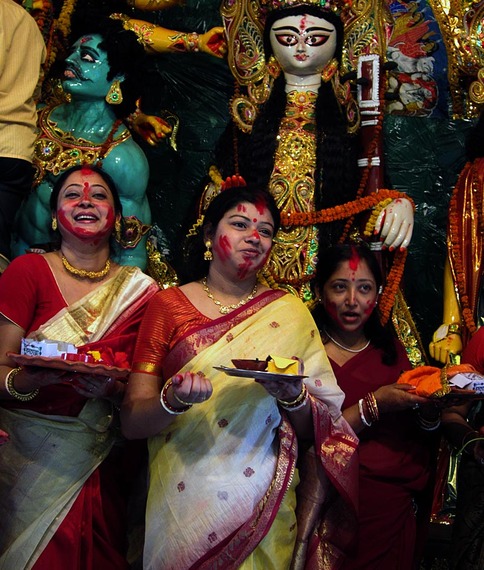
Today millions of Hindu women, and girls, in India and around the world, will proudly perpetuate a festival whose fundamental tenet is misogynistic. This is the festival of Karva Chauth. Women will deprive themselves of food and water all day, and after sunset will break their fast after they've viewed the moon through a kitchen sieve. They've been told that if they do this, the gods will ensure long lives for their husbands.
In a country where every year, more than a 100,000 married women are murdered for dowry -- burnt, hung, stabbed, poisoned, drowned, or driven to suicide -- by their husbands and in-laws, and not a day goes by without media reports of such deaths, this womanly fixation on ensuring a long life for the husband seems sort of bizarre.
"At the heart of this festival's unabashed drive for patriarchal longevity, and the putting of the onus for it on women, is a religious ideology that puts men at par with god."
But there is a cultural explanation for Indian women's fixation on their husbands' long lives. Whether a man lives or dies ultimately defines how his wife is socially perceived and treated! A married woman is called Sumangala -- the fortunate one, the bringer of good luck. A widow, on the other hand is called Amangala -- the unfortunate one, the bringer of bad luck. The reverse logic does not apply to men.
In fact, the widow represents such "ill omen" in India that she's shunned from weddings and other ceremonies, and barred from certain temples and places, just in case her "bad luck" rubs off on other people. Until not that long ago, families would just do away with this "bad luck" through another misogynistic tradition, that of sati -- the burning alive of a widow on her dead husband's funeral pyre. There still are occasional incidents of sati, but by and large, now, many families just throw the "bad luck" widows out onto the streets after usurping their property. There are two towns in north India, Vrindavan and Varanasi, where more than 40,000 such widows live in conditions of abject poverty and various forms of abuse, including sex trafficking.
Yet what perhaps is more amazing is the great excitement with which women -- even modern, educated, professional women -- continue to embrace this festival! It has become a fashion statement for celebrities, with Bollywood actors sending out Karva Chauth wishes via social media and female politicians announcing their fasts for their husbands!
Twenty-first-century India's media and gizmo crazy market is happily promoting this misogyny. There's advice to women on how to prepare for the festival. There's a new application for smart phones that busy, professional women can use in place of a sieve if kitchenware is not handy in their executive offices during work hours! Businesses realize they can bring in more revenue from this sexism by expanding their customer base. Since teenage girls watching their mothers starve for their fathers' long lives think this is such a fun and attractive tradition, why not encourage them to start early. So as this article suggests"a lot of girls fasting for their boyfriends will be switching to the app -- it's easier to tell your mom you're clicking the moon than saying you were fasting for your next-door neighbour boyfriend."
At the heart of this festival's unabashed drive for patriarchal longevity, and the putting of the onus for it on women, is a religious ideology that puts men at par with god. A Hindu woman is told by her religion: "Your husband is Parmeshar (your supreme god.)" There is, in fact, no other religion, that puts the male of the human species at par with god. The Hindu scriptures, the Laws of Manu, have this advice for women: "A virtuous wife should constantly serve her husband like a god, even if he behaves badly, freely indulges his lust, and is devoid of any good qualities [...] It is because a wife obeys her husband that she is exalted in heaven."
 Like Us On Facebook |
Like Us On Facebook |  Follow Us On Twitter |
Follow Us On Twitter |